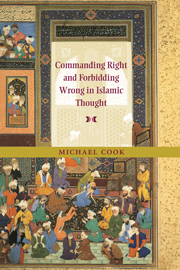Book contents
- Frontmatter
- Contents
- Preface
- Acknowledgements
- PART I INTRODUCTORY
- PART II THE ḤANBALITES
- PART III THE MU'TAZILITES AND SHĪ'ITES
- PART IV OTHER SECTS AND SCHOOLS
- 12 THE ḤANAFĪS
- 13 THE SHĀFI'ITES
- 14 THE MĀLIKĪS
- 15 THE IBĀḌĪS
- 16 GHAZZĀLĪ
- 17 CLASSICAL ISLAM IN RETROSPECT
- PART V BEYOND CLASSICAL ISLAM
- APPENDIX 1 Key Koranic verses and traditions
- APPENDIX 2 Barhebraeus on forbidding wrong
- Bibliography
- Postscript
- Index
13 - THE SHĀFI'ITES
Published online by Cambridge University Press: 07 December 2009
- Frontmatter
- Contents
- Preface
- Acknowledgements
- PART I INTRODUCTORY
- PART II THE ḤANBALITES
- PART III THE MU'TAZILITES AND SHĪ'ITES
- PART IV OTHER SECTS AND SCHOOLS
- 12 THE ḤANAFĪS
- 13 THE SHĀFI'ITES
- 14 THE MĀLIKĪS
- 15 THE IBĀḌĪS
- 16 GHAZZĀLĪ
- 17 CLASSICAL ISLAM IN RETROSPECT
- PART V BEYOND CLASSICAL ISLAM
- APPENDIX 1 Key Koranic verses and traditions
- APPENDIX 2 Barhebraeus on forbidding wrong
- Bibliography
- Postscript
- Index
Summary
INTRODUCTION
In this chapter we shall be concerned with doctrines of forbidding wrong among members of the Shāfi'ite law-school. It is convenient to bring the Shāfi'ites together in this fashion, but not much more. The law-schools of SunnīIslam were, in general, real social communities in a way in which its theological schools were not, and it was primarily within these communities that literary heritages were either transmitted or allowed to die out. Yet the Shāfi'ite tradition proper was a legal one, and here, as elsewhere in Sunnism, forbidding wrong was not included within the compass of the law-book – for all that the well-known Shāfi'ite Ash'arite Juwaynī (d. 478/1085) thought it should have been. The topic was thus left to the theologians. There was, however, no such thing as Shāfi'ite theology. The theological doctrines of Shāfi'ī (d. 204/820) himself, even to the extent that they were transmitted, were of no great importance to Shāfi'ites; and his views on forbidding wrong, fine and upstanding though they doubtless were, are not transmitted at all. It was not until the fifth/eleventh century that the Shāfi'ites acquired a theological identity in the shape of Ash'arism. Even then it was one that they shared with the Mālikīs, and it met with continued resistance from traditionalist Shāfi'ites. The role of Ash'arism as an imported theology was thus comparable to that of Mu'tazilism among the Zaydīs, Imāmīs and ḥanafīs.
- Type
- Chapter
- Information
- Commanding Right and Forbidding Wrong in Islamic Thought , pp. 339 - 356Publisher: Cambridge University PressPrint publication year: 2001



